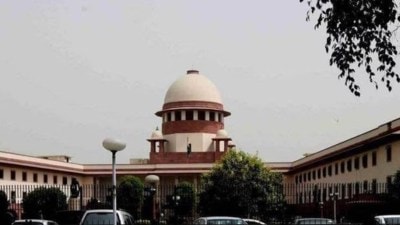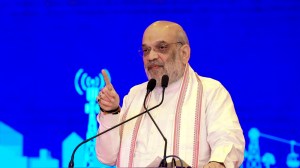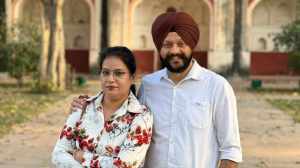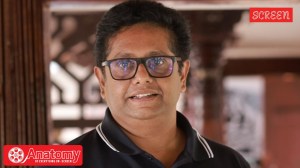‘A big city cannot have a permanent cure for organised crime. The Mumbai underworld is maintaining a tactical quiet now’
It has already been hailed as the novel of 2006. Sanjukta Sharma caught up with Vikram Chandra to find out a little more about ‘Sacred...

It has already been hailed as the novel of 2006. Sanjukta Sharma caught up with Vikram Chandra to find out a little more about ‘Sacred Games’, his novel about Bombay and its underworld. Excerpts from the interview:
• Your forthcoming novel, ‘Sacred Games’, made headlines after HarperCollins outbid others with an advance of $1 million. Being the highest advance for an Indian, expectations are high.
As a writer, it’s all very mysterious. I sat in my room for seven years and wrote this damn thing. I have no idea why and how it fetched this contract. The publisher must have seen some virtue in it, but I don’t exactly know what it is. I certainly don’t see an advance as a marker of excellence. Usually things that make a lot of money are shoddy, so as a reader, I would be sceptical. I hope it’s paisa vasool. The book and its Hindi translation are releasing in India in August 2006.
• Many expletives are already attached to the book, one being “a combination of The Godfather and a Victorian Gothic novel”. How would you describe it?
On the surface, it is about organised crime. Once I started thinking about organised crime and investigated it, I got drawn into the connections that lead to it, the obvious one being politics. But when you think about politics, you inevitably, in today’s context, think religion. All of the peripherals of organised crime in the ’80s and ’90s have thematically made its way into the book.
• Is it also Bombay-centric like your last, ‘Love and Longing in Bombay’?
No. The narrative begins in Bombay, and Bombay is important in the book, but it’s not a Bombay book. Thematically, it’s about the changing nature of many other things that have spread beyond the borders of Bombay.
• Sartaj Singh, the protagonist in Kama, one of the novellas in ‘Love and Longing’, reappears in ‘Sacred Games’. Does the character consummate here?
Sartaj Singh kept haunting me long after I was done with ‘Love and Longing’. I knew that I would have to do something else with him. During the writing of Kama, I was more concerned with the lives of policemen than any other side of the underworld. If you have lived in Bombay in the ’80s and ’90s, you would know that it was impossible to be detached about the underworld. It comes very close to home. Once I was within the earshot of a shootout. A couple of friends were shot at and some wounded in encounter killings. It’s bizarre when someone you know suddenly walks around with two men with machine guns escorting him. We had gotten used to such a sight, but it is a peculiar sight if you think about it. All these stimuli took form once I went away from Bombay and have taken a complete form with ‘Sacred Games’. So I’m hoping to get rid of Sartaj Singh once and for all.
• The Mumbai underworld is dying. Is it still going to appeal to readers?
That’s nonsense. A big city can’t have a permanent cure for organised crime. You can destroy specifics, a certain gang, but there’s always going to be this guy who sees an opportunity and thinks he can make money if he breaks the rules and he’s aggressive enough and courageous enough to make that jump. If it’s not extortion today, it’s going to be some other crime. Criminals are the first to adapt to change. They are very conscious of technology, always on the cutting edge of everything because it helps them. I think the Mumbai underworld is maintaining a tactical quiet now, it’s not going to disappear.
• There has been a surfeit of don films in the Hindi film industry. Do you draw from films?
The underworld guys are deeply interested in the depiction of themselves on the screen and the images also have an influence on the people who are watching. It gets more complicated because some of them also produce films, like the elder brother of Chhota Rajan. So in many of these films the depiction of the mafia is intimate and sympathetic, it’s not unbiased. My take is more detached, also because I have been living outside of Mumbai for a long time. There is no comparison.
• Both your earlier books — ‘Red Earth and Pouring Rain’ and ‘Love and Longing’ — have different narrative structures. Do you consciously adopt a particular stucture or does the plot determine it?
I am interested in form. And especially with ‘Love and Longing’, I consciously tried to tweak traditional structures of detective stories and horror stories. But I start with a character and let him or her marinate in my head. Once I know where they’re going, I ask, how can I experiment with the structure? One of the things that made me happy was that the ghost story from ‘Love and Longing’ was part of an anthology called Best Horror Stories. I was happy that even though I had experimented with the form, it worked as a horror story. It’s too easy and patronising to do parodies and pastiches of genres.
• How does ‘Sacred Games’ play out structurally?
It is quite frame-oriented. Although there’s one person telling the story, it has two parallel narratives, and within these narratives there are these things that I’m calling insets. They pop in the middle and you don’t realise the intention of having them there until you finish the book. The visual representation that I worked with was a circle, a mandala. It’s hard to desc-ribe, but it does make sense when you actually read it. I promise.
• You have co-written Vidhu Vinod Chopra’s ‘Mission Kashmir’. Will you go back to film?
I’m ambiguous about it. Film is a collaborative art and the writer is the least important. You’re not making the art, simply putting the blueprint together. Cinema is about depth of field, sound, frame and rhythm. No wonder Faulkner and Fitzgerald went to Hollywood and became alcoholics. ‘Mission Kashmir’ was an accident. I had gone to Kashmir for some other research and came to know about this police officer whose child had died. Vidhu wanted to make a film on Kashmir and I came and bounced off the idea and we started working on it. Suketu Mehta came in much later.
• You have been a software consultant in the US and have taken a keen interest in technology. Do you see the Internet and blogs as effective tools for writers? Can they bring about a revolution?
Blogs are a revisualisation of the classical diary form. What you’re writing is a diary, but you’re doing it in an instantly accessible format. The audience is conceivably global. What it also indicates is that we are starting to think about about the self much more. Blogs reiterate the notion that the self exists in the public eye, one of the central thrusts of the 21st century. But blogs cannot satisfy the human mind’s hunger for narrative and plot. I want that dead body, and I want the mystery to unfold. Traditional narratives will always be important. It will have newer reincarnations.
• What’s next?
A very long sabbatical.
Photos





- 01
- 02
- 03
- 04
- 05


























